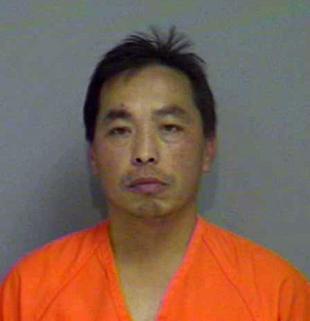PPEcel
cope and seethe
★★★★★
- Joined
- Oct 1, 2018
- Posts
- 29,087
Last Friday, Judge Ralph R. Erickson of the Eighth Circuit Court of Appeals published a 232-page order (PDF attached) in the 17-year legal saga that is United States v. Alfonso Rodriguez, Jr., involving the murder of college sorority femoid Dru Sjodin in 2003.
Judge Erickson vacated the sentence that he himself issued to Rodriguez as the trial judge in 2007.
Related news article:

 apnews.com
apnews.com
The Truecel

By anyone's standards, Alfonso Rodriguez, Jr. lived a cruel, wretched life.
The Femoid

Judge Erickson described at length how great her personality (teehee) and life supposedly was.
The Story
About as you'd expect. Stacy never gets to marry Chad.
The truecel killed the Stacy. Her body is found five months later, naked from the waist down, hands tied behind her back, a laceration on her neck that stretched from ear to ear. The case gets massive media attention, because well, murdered white femoids get more attention than murdered people of any other demographic. The U.S. National Sex Offenders Public Registry was named after her in 2006.
Neither Minnesota nor North Dakota has the state death penalty. But since the truecel transported the Stacy across state lines, federal jurisdiction was invoked, and the case became the first death penalty trial in North Dakota in over a century. A jury convicted and sentenced him to death in 2007. The truecel's legal team appealed to the Eighth Circuit and lost; the Supreme Court denied certiorari, thus concluding the criminal proceeding.
Vacating the Sentence
A second legal team filed a civil habeas motion under 28 U.S.C. § 2255 seeking to overturn the truecel's conviction and sentence. They ultimately advanced approximately 21 claims, most of which were denied. But two claims were great enough for Judge Erickson to overturn the truecel's death sentence and redo sentencing.
1. A simp medical examiner, Michael McGee, blatantly lied as to whether there was sound evidence that semen was found on the Stacy's corpse. This was (IMO) the most compelling reason.
2. The trial legal team limited the truecel's mental health evaluation, failed to consider an insanity defense, and failed to offer evidence of the truecel's PTSD.
Based, though the judge should've gone further and vacated the conviction as well as the sentence. Normies are seething on news article comments, as if the identity of the victim should override the procedural safeguards that moderate the power of the state.
Judge Erickson vacated the sentence that he himself issued to Rodriguez as the trial judge in 2007.
Related news article:

Judge tosses death sentence in Dru Sjodin slaying
FARGO, N.D. (AP) — A federal judge has thrown out the death sentence for a man convicted in the 2003 slaying of a North Dakota college student, saying new evidence shows that the medical examiner was “guessing” on the stand and defense lawyers did not adequately explore mental health evidence.
The Truecel
By anyone's standards, Alfonso Rodriguez, Jr. lived a cruel, wretched life.
At age four or five, Rodriguez was sent away with Sylvia [his sister] to stay at a camp for migrant children while his parents worked in the fields. Rodriguez was small for his age and vulnerable. It was here that Rodriguez was sexually abused by a female for the first time. Sylvia witnessed the abuse. Later, during potato harvest in North Dakota around this same time frame, a male forced Rodriguez and Sylvia into an outhouse and coerced the children to fondle him and perform sex acts on him. Rodriguez was sexually abused another time by a college-age female when he was six years old at a church camp. While in Laredo, when he was seven years old, Rodriguez was molested by a teenage boy.
Life was particularly difficult for Rodriguez. His brother “Paco,” although two years younger than Rodriguez, passed Rodriguez in school. Paco was handsome, athletic, and embarrassed of his older brother, Alfonso. Rodriguez was short in stature, had a big head, had darker skin than the other Rodriguez children, walked with a limp because one of his legs was shorter than the other, and his hands shook from tremors. Being slow and different from most children, Rodriguez was an easy and irresistible target for bullies. Rodriguez would often sit quietly and watch other children play. He was an outsider.
Rodriguez dropped out of school during his second year in the 9th grade. He was 18 years old and unable to successfully complete basic 9th grade coursework. Rodriguez has been incarcerated for all but approximately three and a half years of his [adult life].
The Femoid
Judge Erickson described at length how great her personality (teehee) and life supposedly was.
Dru Katrina Sjodin made people feel comfortable. She brought people together and joined them in laughter. At a street dance, Dru accepted the hand of a male in a wheelchair and then danced with him. She played volleyball and basketball. She was a skilled golfer. As a child, Dru was spontaneous and kind—always creating cards and artwork for someone else. She loved photography. She was a talented artist who enjoyed painting and drawing. Her childhood nickname was “Doodles.”
One of the many activities Dru did as a volunteer was taking underprivileged children bowling. She raised money for organizations like the American Diabetes Association. She helped kindergartners and first graders learn to read. While in college, Dru participated in events that raised awareness for violence against women and children.
After high school, Dru attended the University of North Dakota in Grand Forks, North Dakota. She joined a sorority. While in school, Dru held a job and continued volunteering. She started dating Chris. Chris was drawn to her smile. Dru made Chris feel wonderful about himself. Chris told Dru he loved her. Dru told her friends that she may have met the guy she wanted to marry. Dru had recently introduced Chris to her parents.
The Story
About as you'd expect. Stacy never gets to marry Chad.
The truecel killed the Stacy. Her body is found five months later, naked from the waist down, hands tied behind her back, a laceration on her neck that stretched from ear to ear. The case gets massive media attention, because well, murdered white femoids get more attention than murdered people of any other demographic. The U.S. National Sex Offenders Public Registry was named after her in 2006.
Neither Minnesota nor North Dakota has the state death penalty. But since the truecel transported the Stacy across state lines, federal jurisdiction was invoked, and the case became the first death penalty trial in North Dakota in over a century. A jury convicted and sentenced him to death in 2007. The truecel's legal team appealed to the Eighth Circuit and lost; the Supreme Court denied certiorari, thus concluding the criminal proceeding.
Vacating the Sentence
A second legal team filed a civil habeas motion under 28 U.S.C. § 2255 seeking to overturn the truecel's conviction and sentence. They ultimately advanced approximately 21 claims, most of which were denied. But two claims were great enough for Judge Erickson to overturn the truecel's death sentence and redo sentencing.
1. A simp medical examiner, Michael McGee, blatantly lied as to whether there was sound evidence that semen was found on the Stacy's corpse. This was (IMO) the most compelling reason.
Judge Erickson concluded that had he known the information he knew now during the trial, he would have granted the defense's Daubert motion to exclude the medical examiner's semen-related testimony under Rule 702 of the Federal Rules of Evidence."The evidence in the record demonstrates that McGee did much more than merely follow where the evidence and science led him. Instead, he chose to play the role of a super sleuth, something akin to Sherlock Holmes. McGee provided the government with a theory worthy of capital punishment."
2. The trial legal team limited the truecel's mental health evaluation, failed to consider an insanity defense, and failed to offer evidence of the truecel's PTSD.
Based, though the judge should've gone further and vacated the conviction as well as the sentence. Normies are seething on news article comments, as if the identity of the victim should override the procedural safeguards that moderate the power of the state.







